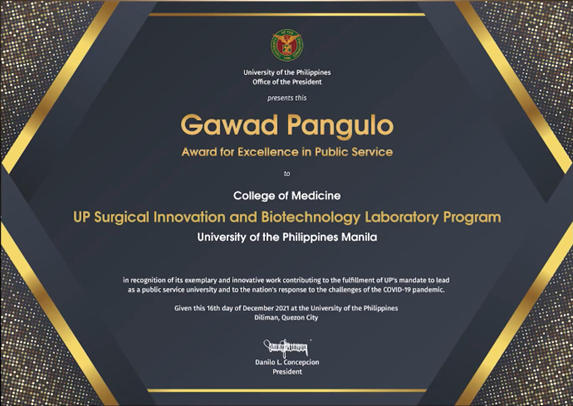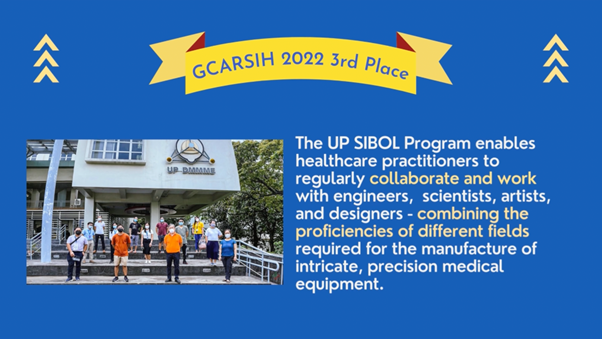Introduction
We all need medical care that works for us. Yet, almost half of Filipinos do not have access to the right medical tools and services just when they need it most. Recent years have shown us that emergencies are unpredictable. So it’s essential to prepare before a problem turns into a crisis. UP SIBOL is tackling these challenges head on.
Program Paradigm & Team
We are a group of healthcare professionals, product designers and engineers from the University of the Philippines who have banded together to create locally-designed and Philippine-manufactured medical devices. We aspire to give more Filipinos access to medical tools that would help them lead longer, healthier lives. At UP SIBOL, science fuels our creations while care and compassion power us forward. We're working together for a better equipped, better prepared, better than ever, Philippines.
Contact Us
upsibol@up.edu.phDr. Edward HM Wang, Program Leader
Team Members
| Name | Position | Affiliation |
|---|---|---|
| Edward H.M. Wang, M.D., MSc | Program Leader | PGH Department of Orthopedics |
| Philip B. Fullante, M.D., FPSO HNS | Program Coordinator | PGH Department of Otorhinolaryngology |
| Miguel Sandino O. Aljibe, LME, M.D. | Project Manager | UP SIBOL |
| Miguel J. Paraiso | Project Administrator | UP SIBOL |
| Jenna Mendoza-Gonzales | Project Staff | UP SIBOL |
| Mary Jane Yapo | Project Staff | UP SIBOL |
Summary of Project
UP SIBOL was born in December 2019 with a grant from the Philippine Council for Health Research & Development (PCHRD) of the Department of Science and Technology (DOST). COVID struck immediately not long afterwards. Seeing our fellow Filipinos succumb to the virus, we could not sit idly by. Committed to protecting our frontliners, even without money nor equipment, we convened a COVID Task Force with three teams: ‘PPE’, ‘disinfection’, ‘telemonitoring’ to Defend, Disinfect and Distance. Each team had several subgroups working on a specific device, led by a clinician and an engineer with volunteer specialists from across the UP Colleges.
Instant messaging and online video apps powered our collaborations. Despite unending lockdowns, we scoured the city for components; created make-shift factories in the UP campuses and even our homes; sought support from friends and allies; worked into weekends; endured infections; and innovated much-needed prototypes with the meager resources available.
Our teams successfully deployed our anti-COVID devices to the Philippine General Hospital. And our work has inspired greater cooperation between the different campuses of UP, leading to SIBOL-sponsored meetings between UPM and UPD, Health Innovation Lectures, a health innovation course in UPD, a student immersion program and even requests from the Department of Health for joint projects.
At UP SIBOL we continue the tradition of UP leadership, resilience and dedication to the underserved. Turning the pandemic crisis into an opportunity, we collaborate and innovate to give the Filipino people longer and healthier lives.
Contact Us
upsibol@up.edu.phDr. Philip Fullante, Program Coordinator
Team Members
| Name | Position | Affiliation |
|---|---|---|
| Emmanuel P. Estrella, MD, MSc | Project Leader | PGH Department of Orthopedics |
| Eduardo R. Magdaluyo, Jr., PhD | Project Co-Leader | UPD CoE Department of Mining, Metallurgical, and Materials Engineering |
| Nathaniel Orillaza, Jr., MD | Project Member | PGH Department of Orthopedics |
| Maria Patricia Valdez, MD | Project Member | PGH Department of Orthopedics |
| Jason Pechardo, MS | Project Member | UPD CoE Department of Mining, Metallurgical, and Materials Engineering |
| Earl Patrick Caburnay | Project Member | |
| Jonard Jairo Reyes | Project Member | |
| Lora Jose Hernandez | Project Member | |
| Carlos Garcia | Project Member | |
| Ulysses Ante | Project Member | |
| Johann Biscocho | Project Member | |
| Leif Coronado | Project Member |
Summary of Project
External fixation is a treatment used for severe fractures. It makes use of pins and rods that hold the bones in place as the fracture heals. An external fixator is commonly made of stainless steels and titanium alloys. These materials are capable of properly supporting a fracture and maintaining its alignment while the bone is healing. However, they have their drawbacks. These materials are not the most biocompatible because they release toxic metals in the body as they corrode. This could cause irritation, allergic reactions, and deep wound infections. In addition, these metals are dense. Their weight affects the patient’s comfort and mobility. They also have greater radiodensities than the bone, thus preventing a more accurate assessment of a fracture.
Aside from these reasons, modular external fixator systems of today are not manufactured locally in the Philippines. Because of this, they are more expensive and can be cost-prohibitive to the general public. This also means that they are not designed for Filipinos, whose bone structure is generally smaller than the Western population. This calls for an implementation of a standardized design and protocol for external fixation in the country. With these, the project aims to produce external fixator systems at a low cost to make it more affordable to communities and healthcare facilities in the Philippines
Contact Us
epestrella@up.edu.phEmmanuel P. Estrella, MD, MSc
The 4th Gawad Pangulo Award for Excellence in Public Service is an award given by the UP System, Padayon Public Service Office of the University of the Philippines. Given last December 16, 2021, the award is in recognition of the program’s exemplary and innovative work contributing to the fulfillment of UP’s mandate to lead as a public service university and to the nation’s response to the challenges of the COVID-19 pandemic.

3rd place, Gelia Castillo Award for Research on Social Innovations in Health (GCARSIH) Award
The Gelia Castillo Award for Research on Social Innovations in Health (GCARSIH) Award is an annual award given by the Department of Science and Technology - Philippine Council for Health Research and Development (DOST-PCHRD) in recognition of social innovations that address health challenges and improve health care delivery in the Philippines. The announcement was made during the Philippine National Health Research System (PNHRS) week celebrations last August 2022.
*plaque yet to be sent by PCHRD
